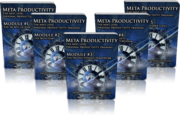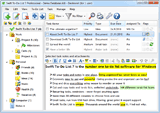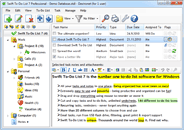The following 3 techniques are extremely powerful and work instantly. I’ve been developing and refining them over the years – they are based on solid proven psychological and productivity principles.
In order to beat procrastination, first of all, pick just one important task you are procrastinating on. Then use the following 3 techniques, and I personally guarantee you that you will stop procrastinating and start working on the task immediately.
1. Explore and map the task
Procrastination is often related to fear. We are often afraid of unknown work. After all, it might be too much work, or we might be unable to do it. The easiest way to reduce this fear is to explore, map and research the task.
So, how do you explore a task? Well -
Just break the task down into subtasks! This is the best way to “explore” it, unpack it and see what’s really going on.
If you use Swift To-Do List, to break a task down into subtasks, simply select it, then start adding subtasks with all the steps necessary for completing the task.
Add even all the small steps. Try to order the subtasks roughly in the sequence they need to be done.
While you are adding the subtasks, pay extra attention to all the “research” actions – steps that require you to gather extra information and data in order to move forward. These “research” actions are what you want to do first, because doing them will help you to unpack the original task even further.
Once you break the task into subtasks AND start gathering all the necessary information, materials and data, and possibly discuss it with your co-workers or boss, the fear of unknown will diminish, and as a result, you will be able to start doing the task right away without procrastinating anymore.
2. Find the smallest possible next step – then do it!
When we procrastinate, we often feel that we are simply unable to do the task. However, when you identify a tiny easy action to get started on the task, you will be absolutely confident that you can do it.
For example, you might be procrastinating on this task: “Write the 70-page Q3 report”
So, you quickly think about what you actually need to do to get started on it, and determine this smallest possible next step: “Open MS Word and write a rough half-page outline of the Q3 report”
Can you open MS Word and write a rough half-page outline? Of course you can! You know you can absolutely do it. You are confident. So there is no reason to procrastinate anymore. You can just do it. So you do it.
And once you do it, you can simply repeat this process – what is the next small easy step?
3. Schedule fun and limit the work
This technique might seem counter-intuitive at first, but it’s extremely effective. It uses powerful reverse-psychology.
Get this -
Another big reason for procrastination is the fear you will miss out on all the fun and pleasant things in life.
The solution is ridiculously simple: Guarantee the fun first. Then limit the time you have available for work.
Simply schedule some fun! Plan and schedule a night out. Or, schedule any of your favorite relaxation, entertainment, sport or fun activity that you just love.
Ideally, schedule this pleasant activity right after work.
Next, limit the time you have available for your work. Give yourself a hard time limit that forces you to stop working at a specific time of the day. Absolutely no overtimes allowed. This will motivate you to stop procrastinating and get to work, right now.
Tip: When scheduling the fun activity, ideally pick an activity right after work that involves other people. You will know that you HAVE to be there because of the other people, so you will know that there is a very real time limit on your work today. This will strongly motivate you.
As an extra bonus, the fun activity will help you recharge your batteries and sharpen your saw, so the next time you get to work, you are strong. Obviously, this also makes you immune to burnout.
How procrastination works
If you want to learn more about how and why you procrastinate, you will love this.
Here’s my summary of The Now Habit, which is probably the best book on procrastination ever written.
This summary will give you the most important insights from the book in just a few pages.
In the summary, you will also learn additional causes of procrastination (perfectionism, fear of judgment, fear of success, and more).






